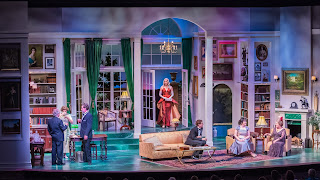First of all, once again my thanks for your lovely Christmas gift, which I know that Tim and I will enjoy! And for understanding why we can't have a meeting in January.
After a bit of thought I thought we would start 2018 off with an Agatha Christie: there's just one left in my book of selected plays, and I shall enjoy looking for another compilation for us to work through!
The Hollow is a typical 'country house mystery' and an adaptation of a book of the same name, but, unlike in the book, it is not Hercule Poirot who is the detective. This might be explained by Christie's intense dislike for her Belgian sleuth, and she is recorded as having said that she particularly disliked his appearance in this novel: in her autobiography she claimed that she "ruined [her own novel] by the introduction of Poirot".
Despite this, The Hollow has been successfully staged in the theatre, on film and, of course, on TV.
The Hollow
The eccentric Lucy Angkatell has invited the Christows, along with other members of her extended family, to her estate for the weekend. John Christow is carrying on an affair with Henrietta Angkatell, a talented sculptor. The beautiful Veronica Cray, an old flame of Christow's, suddenly appears in the house on Saturday night to borrow a box of matches ...
Characters
- Sir Henry Angkatell, the owner of The Hollow. He married his distant cousin, Lucy Angkatell.
- Lucy, Lady Angkatell, Henry's wife, whose sociable, charismatic veneer hides a dark side to her personality, occasionally glimpsed by her family.
- Edward Angkatell, a distant cousin of Henry and inheritor of the family's beloved house, Ainswick. He has charm but is overshadowed by Christow's dominant personality. He lives in the past and has been devoted to Henrietta for many years. He despises himself, thinking he is good for nothing.
- Midge Harvey, Lucy's young cousin. Only partly related to the Angkatell family, she refuses financial aid from them and works in a dressmaker's shop.
- Henrietta Angkatell, a sculptor, and cousin of Sir Henry, Lucy, Midge, Edward and David. She always knows the right words to say to make someone feel comfortable, albeit sometimes at the expense of the truth. Her art is the core of her being, which, at times, conflicts with her second important characteristic. She loves John Christow more than life itself.
- Dr John Christow, a Harley Street doctor. He is passionate about his work and dedicates himself to finding a cure for "Ridgeway's disease" – the aetiology of which bears a marked resemblance to multiple sclerosis. He is very self-confident, attractive, and has great charisma.
- Gerda Christow, John's wife. She is rather plain and stupid. She worries about everything. She idealises John, and blames herself for her problems, even when he is wrong.
- Veronica Cray, an actress. She is very beautiful and abnormally egotistical. She wanted Christow to abandon everything to follow her to Hollywood, but he rejected her; she found this unbearable. However, Christow is still attracted to her and, it is implied, had a one-night stand with her, which triggered Gerda's jealousy.
- Gudgeon, the butler.
- Doris, a maid
- Inspector Colquhoun
- D.S. Penny
There is a reference to a newspaper called The News of the World: It is no longer published, but was a huge-selling Sunday paper specialising in gossip and scandal.
The set for The Hollow is rather detailed, but I think that this picture is the closest to the long explanation!
Please let me know that you are coming by doodling here: https://doodle.com/poll/kugwcg6bcwc52r6a Thank you!
Finally, as I am writing this in December, I wish you all ...





















